Good To Be Home

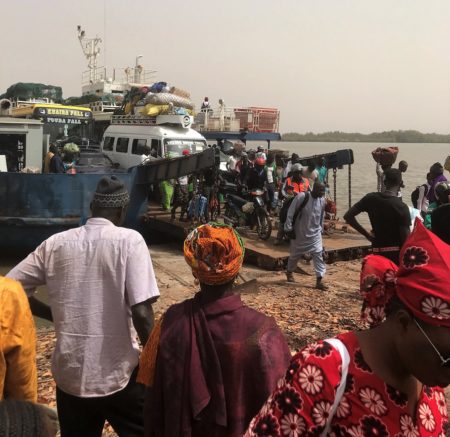
At the completion of training, we were driven to Soma, where we could get transportation to our various destinations. This was the first time I had made the river crossing solo, and although I was a bit apprehensive, I discovered my senior status was an advantage. I needed to take a jele-jele from Soma to the ferry, and then another jele-jele into Farafenni from the ferry. A jele-jele is a van, retrofitted to fit up to 40 people on hard bench seats, and these vehicles are not what we would consider road worthy in America. One jele-jele needed to be restarted with a screwdriver every time it came to a stop. If the screwdriver key didn’t work, then men got and pushed it – fortunately The Gambia is a very flat country. A jele-jele being loaded won’t depart until it is completely full, and the drivers will push and shove everyone to get as many people on board as possible. I was fortunate that I had a comfortable seat, after they had someone give up their place for me.
Taking the ferry is also a challenge, because there are usually more passengers waiting to board, than there is space on the ferry. As the arriving ferry unloads, it’s critical to get as close to the front of the line as possible. I had my backpack and I was carrying a duffel, but a local women could have a baby on her back, another child or two to keep track of, while pulling her suitcase. Even before the last vehicle drives off, people are squeezing up the ramp and hurrying to find a seat. If you are lucky enough to find a seat, you wait while the trucks load on, spewing out diesel fumes into your face, making an outside seat by the water preferable. A nice women and her three children made space for me to sit on the outside, once again proving senior status is an advantage.
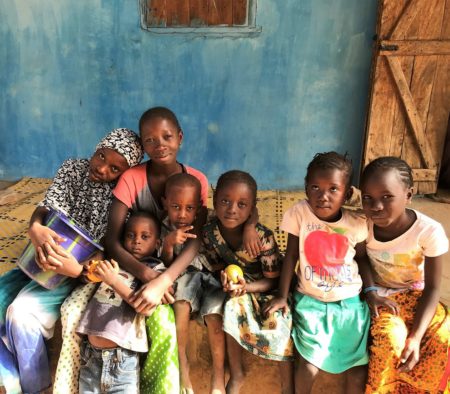
The saying “absence makes the heart grow fonder” definitely applies to my PCV home in Farafenni. I was gone almost a month, sharing space with others in bunk house situations. The young volunteers can party the night away, but I am an early riser and staying up late is taxing. Breakfast was served at 7am and classes started at 8am, and my senior status was not an advantage.
I was welcomed home by the beautiful children of my compound, arriving early enough in the day to clean my rooms. At this time of year strong winds blow off the Sahara Desert and everything is covered in a thick layer of dust. Fortunately the water was working and I was able to wash the curtains, sheets and mop the floor so I could enjoy my own private space again.

Sleeping in my own bed and having time to myself was very revitalizing. I also missed my regular yoga practice, and lately I’ve been using an App on my iPhone – Down Dog: Great Yoga Anywhere. This App is very user friendly, has different practice levels, great sequences, nice music, and the instructor has good cues in a soothing voice. Down Dog is my personal African yoga studio.
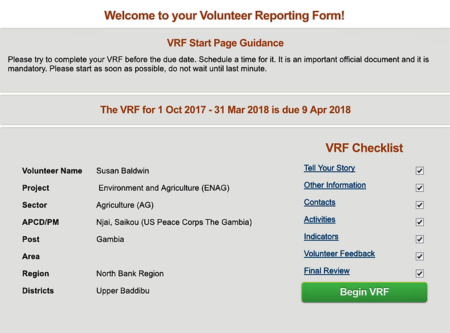
Now that my training is over, it’s time to get to “work”. I spent mornings the first week back home completing tasks on the computer, but after lunch I biked to the garden to harvest the produce that ripened while I was away. Every PCV is required to submit their VRF (Volunteer Reporting Form) twice a year. As a new PCV who has spent the last six months in training sessions and learning about my permanent site community, completing this task was more about learning what will be expected for future reports.
The VRF has sections on what challenges you faced, things you learned about yourself, community or assignment, and any success stories. Language is still a challenge for me and not having a good foundation in Mandinka, created problems trying to communicate with the assistant gardener at my school site. Just two weeks after I arrived at my site, my counterpart left for the three week holiday period to spend time with his family on the other side of the river. My job was to help with the garden watering and care of the chickens while he was gone, and it was nice to have some structure during those early days. But, I discovered his assistant does not have a strong work ethic. It was difficult for me to communicate with him the importance of watering the garden everyday, or making sure the chickens had food.
My first three months in Farafenni have been full of interesting experiences – both failures and successes. I was pleased with the results of the interview I had with the school accountant, Anna Mendy, who I wrote about in my GAD post. During Women’s History Month this interview was one of many reports selected and read on the local radio station by a group of PCVs. My Community Entry Period has definitely had more positive experiences than negative ones, but I’m also a firm believer that a failure can be an excellent learning opportunity.
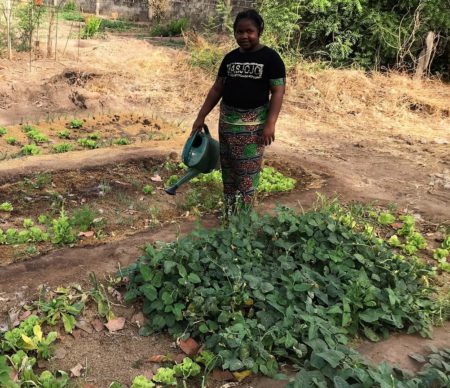
Returning home to my garden that was well cared for by the students and my counterpart was a real treat. The cooks at Masembeh fix mostly Gambian food, which is too heavy for my liking. Breakfast was usually bread with beans, meat was served at most meals, and rarely did we get fresh fruit. I missed eating green salads, raw vegetables, fruit and yogurt. We are fortunate that fruits and vegetables don’t have to be peeled before eating, because of the improvements to the water supply. If the water comes from a covered well and is stored in a closed tank, it is generally safe to drink.
It was wonderful to be able to harvest beans, radish, onions, and lettuce, and fix my own meals. The day after I returned I planted two varieties of sweet corn, with the open pollinated seeds my family sent me from Oregon. I am hoping these seeds do well and I can harvest at the beginning of rainy season. One of my projects will be to grow these heirloom plants that produce seed true to type, and save the seeds for future plantings. The rainy season arrives in June, and if I’m successful I will have seed to plant a crop of sweet corn to share with everyone.
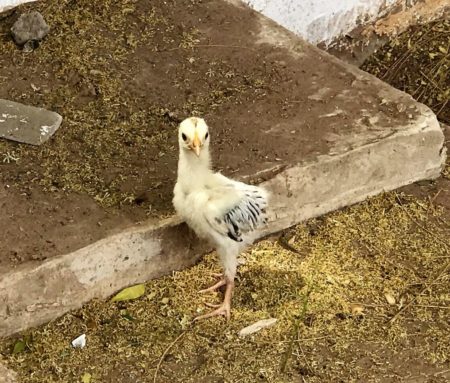
The chicken project is also doing very well, and the dozen new chicks are growing fast. If all of them survive it will double the population, although we will only be keeping the hens. The males will be sold, our current rooster is still doing a great job. We aren’t getting a lot of eggs to eat yet, because the hens are still being broody and we expect more chicks to hatch soon.
It’s really nice to be back home, I enjoy the farming routine. There are many opportunities to participate in off site activities, but I hope to keep my travel to a minimum, so I can work on the projects I discussed in my last post. Developing sustainable farming techniques is the essence of what I want to accomplish while in service.
9 thoughts on “Good To Be Home”
Another really interesting blog, Susan! It is a high point of my week to get the notification that the next installment of your Gambian adventure has arrived.
Susan, I really enjoy your blogs. It reminds me of my own success and failures in the Peace Corps back in the 60’s. Your experiences seem much more structured and prepared then was ours, but the times were different. Clean water is essential for health gardens and healthy people so whatever is nesssary to achieve this goal is both worthy and of the utmost importance. THanks for all you are doing and being.
The traveling sounds challenging but what an experience! I like the hobbit house! The bee keeping techniques interesting to read about and your pictures really are good! Take care Susan!
We are shearing our llamas in two weeks!
Do you need more seeds???? I have surplus that might grow there – cantaloupes, watermelon, others….
YES – seeds are always welcome, especially open pollinated varieties, but any seeds received will be planted. I will give reports on how the seeds did here in The Gambia. Send by regular mail with the US Post Office. Be advised that there are weight limits (I think 2 pounds) to get the best postage rate. Do not send priority – it’s a waste of money because the packages won’t arrive any sooner. Thank you
Snail mail address: Susan Baldwin, PCV
Peace Corps
P.M.B. 527
Serekunda, The Gambia
West Africa
Your “jele-jele” story reminded me of the rural buses in Lebanon in the sixties – jamming everyone in, including chickens, with some possessions lashed onto the roof. Also there were “services” (pronounced “sair-veeses”) which were always old Mercedes that served as communal taxis – again, jamming everyone in (and sometimes the motor died at stop signs, which the drivers tended to ignore).
Most of the taxis here are Mercedes, and none of them would be allowed on any US road. Also, there must be a “law” requiring the driver to wear a seat belt, but the belt is generally permanently fastened behind his back, and when he comes to a check point, he’ll loop it over his shoulder until he’s waved on.
Susan, I really enjoy reading your Peace Corps experiences. Lover the picture of the ferry coupled with the smells. Something to be said for gray hair. It is a cultural difference. Nice to know that you do not need to use the vegetable peeler.
Amy – I do use the peeler for my carrots and radishes because it is much easier than scrubbing all the dirt off. I also love the Lucy solar light you gave me, it is the perfect night light and is a lifesaver when the power goes out. Thank you!
Comments are closed.